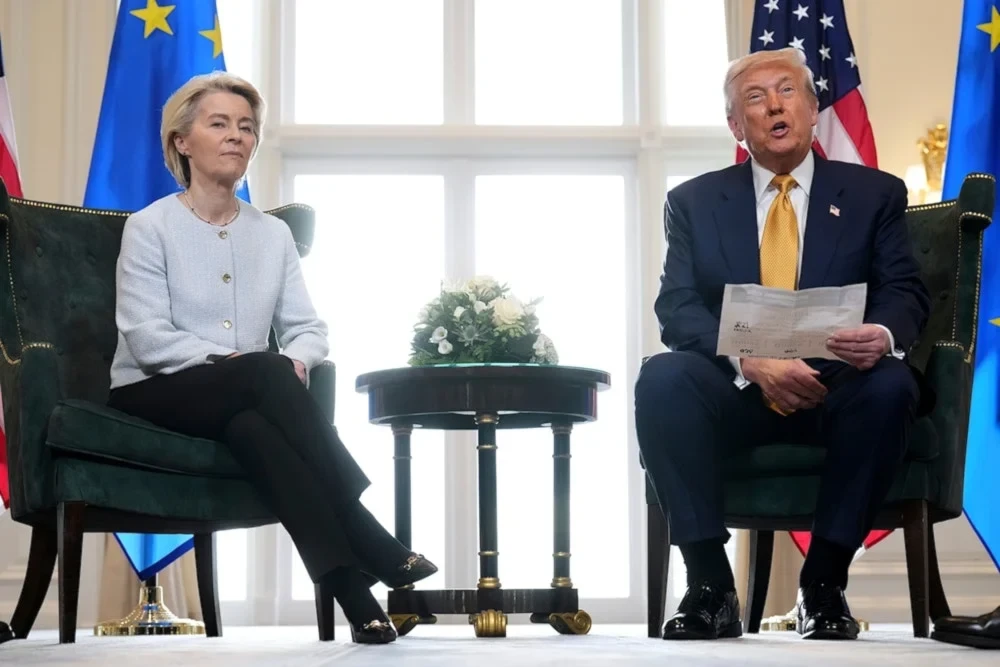Europe’s summer of submission: US pressure exposes EU fragility - FT
Faced with Trump’s coercive power politics, the EU has surrendered economically, militarily, and politically—exposing its fragmentation, dependency, and global impotence.
-

US President Donald Trump reads from a paper and European Commission President Ursula von der Leyen listens after reaching a trade deal between the US and the EU at the Trump Turnberry golf course in Scotland, Sunday, July 27, 2025. (AP)
In a Financial Times column, Marc De Vos, co-CEO of the Brussels-based Itinera Institute and author of Superpower Europe: The European Union’s Silent Revolution, reflects on the precarious state of transatlantic relations at the outset of the summer.
With NATO, Ukraine, and the global trading system all under threat, Europe appeared poised for a potential rupture with Washington. Yet as the EU heads into its summer recess, De Vos notes that European leaders may be exhaling, for now. The man who once dismissed NATO as “obsolete,” pledged to end the Ukraine war in 24 hours, and labelled the EU a “foe,” has thus far refrained from triggering a full break.
Yet that reprieve has come at a steep price. In order to stay onside with Donald Trump, European leaders have, in effect, capitulated, financially and politically, three times over. First, by committing to vast increases in defense spending for NATO; then by agreeing to pay the US for weapons destined for Ukraine; and finally, this week, by accepting a trade framework that allows Washington to escalate tariffs unilaterally, even as Europe pledges over $1.3 trillion in purchases of American energy, arms, and investment.
European negotiators have attempted to temper the optics, pointing to the fact that US tariffs on other nations remain higher, that core EU safety and product regulations are intact, and that US energy presents a strategic alternative to Russian supplies. Weapons purchases, they argue, were already factored into NATO plans. Much of the promised investment is aspirational, and in any case, European capital has long flowed into the US economy.
This may be a tolerable cost for transatlantic economic stability, provided Trump doesn’t reverse course and sectors like steel or pharmaceuticals aren’t next in line for tariff punishment. But there is no escaping the broader truth: the world’s leading multilateral free-trade bloc has been strong-armed into submission. The EU’s president, Ursula von der Leyen, even found herself echoing Trump’s narrative, portraying Europe as a trade offender in a bid to placate Washington.
The ugly truth
At the heart of the matter lies a sobering reality, according to the FT piece: Europe, as a collective force, lacks the economic weight, military muscle, and shared vision needed to defend its interests on the global stage. It is unable to confront the US in a trade conflict because it is fragmented. It dares not provoke one because it is vulnerable. And it cannot navigate the blunt-force tactics of Trump’s power politics through the procedural machinery for which the EU was designed. Washington has long known this. Now, so does the rest of the world. Europe’s relief masks an impotence born of humiliation, as per the author.
In De Vos's view, the question now is whether this enforced appeasement will galvanise the EU into becoming a serious geopolitical player, or further deepen its divisions and dependencies. So far, the signs are discouraging. While defense spending is rising across the continent, cooperation remains limited to encouraging joint procurement at the national level. Even after three and a half years of war in Ukraine, the EU remains unable to manufacture the weapons Kiev so desperately needs.
Ambitious proposals to bolster Europe’s internal market in strategic sectors, energy, defense, communications, and finance have been put forward in respected policy circles. Yet they continue to stall in the political arena. Efforts to reverse industrial decline are increasingly characterised by state-centric interventions that bypass EU-level coordination. And the mere suggestion of pooling more common European funds remains politically toxic, as evidenced by the wrangling over the next EU budget.
Perhaps the most consequential development of the year has been Germany’s return to militarism, with a €600 billion five-year defense plan. But instead of positioning itself at the helm of a European defense renaissance, Berlin’s “Made for Germany” doctrine reflects a nationalistic turn, one that sidelines any broader European integration.
The Franco-British Lancaster House Agreement, recently revived, follows a similar logic. It cements bilateral military cooperation between two nuclear powers but contributes little to a pan-European defence architecture.
Europe’s founding visionaries, as per the piece, offered starkly different forecasts for the continent’s future. Jean Monnet famously believed that “Europe will be forged in crises,” while Paul-Henri Spaak warned that “there are only two types of states in Europe: small states, and small states that have not yet realised that they are small.”
If Europe is to overcome this period of public subservience and latent fragmentation, "its leading nations must remember Spaak and relearn Monnet".
Read next: Europe slams Trump trade deal as humiliating concession

 5 Min Read
5 Min Read










